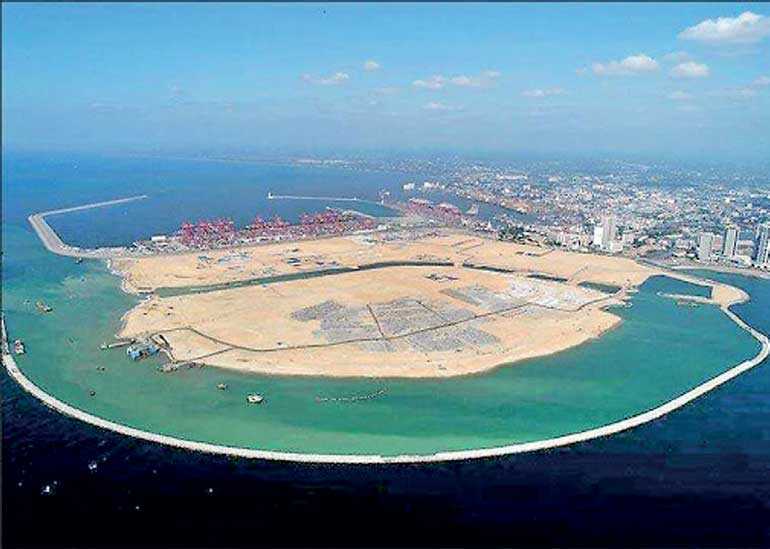Monday Feb 23, 2026
Monday Feb 23, 2026
Tuesday, 11 May 2021 00:00 - - {{hitsCtrl.values.hits}}

To date, there is not even an iota of evidence that Free Trade Zones have eroded into national sovereignty in the sense in which the term of national sovereignty is interpreted in public international law
 The finalisation of the Colombo Port City Economic Commission Bill has reignited the much-debated argument as to whether Free Trade Zones (FTZs) or similar entities erode national sovereignty.
The finalisation of the Colombo Port City Economic Commission Bill has reignited the much-debated argument as to whether Free Trade Zones (FTZs) or similar entities erode national sovereignty.
Free Trade Zones are also known by other nomenclature such as free zones, freeport zones, port free trade zones, foreign trade zones, e-zones, duty free trade zones, commercial free trade zones, export processing zones, logistic zones, trade development zones, industrial zones/parks/areas, hi-tech industry parks, hi-tech and neo-tech industrial development zones, investment zones, bonded zones, special economic zones, economic development zones, economic and technological development zones, resource economic development zones and border economic cooperation zones.
Special Economic Zones
This point is well illustrated in a World Bank study entitled Special Economic Zones: Progress, Emerging Challenges, and Future Directions:
‘Ask three people to describe a Special Economic Zone (SEZ) and three very different images may emerge. The first person may describe a fenced-in industrial estate in a developing country, populated by footloose multinational corporations (MNCs) enjoying tax breaks, with labourers in garment factories working in substandard conditions. In contrast, the second person may recount the ‘miracle of Shenzhen,’ a fishing village transformed into a cosmopolitan city of 14 million, with per capita gross domestic product (GDP) growing 100-fold, in the 30 years since it was designated as an SEZ. A third person may think about places like Dubai or Singapore, whose ports serve as the basis for wide range of trade- and logistics-oriented activities.
‘In fact, all three of these are correct descriptions of this diverse instrument…But despite the many variations in name and form, all SEZs can be broadly defined as— demarcated geographic areas contained within a country’s national boundaries where the rules of business are different from those that prevail in the national territory. These differential rules principally deal with investment conditions, international trade and customs, taxation, and the regulatory environment; whereby the zone is given a business environment that is intended to be more liberal from a policy perspective and more effective from an administrative perspective than that of the national territory.’
Free Trade Zones
Depending on the terminology used, and the regulatory framework there are subtle differences in concessions, requirements and benefits. According to studies Free Trade Zones were originally organised around major seaports, international airports, and national frontiers. Examples include Hong Kong, Singapore, Colón (Panama), Copenhagen, Stockholm, Gdańsk (Poland), Los Angeles, and New York City. In some large seaports (e.g., London and Amsterdam bonded warehouse and associated systems are used. The rationale for Free Trade Zones was to remove from a seaport, airport, or border those hindrances to trade caused by high tariffs, complex customs regulations, import/export restrictions, bureaucratic inefficiency, bribery and corruption, etc.
The Financial Action Task Force estimated in 2010 that there are approximately 3,000 zones in 135 countries worldwide. In 2007, total exports from FTZs were estimated at $ 400 billion. The Colon Free Zone in Panama, the world’s second largest FTZ, generated $ 8.6 billion in exports and re-exports in 2008. In the United States Free Trade Zones were first authorised in 1934.
Enterprise Zones
Enterprise Zones are part of the UK Government’s wider Industrial Strategy to support businesses and enable local economic growth. The first 24 Zones were launched in 2012 and 24 new Zones were created in 2016 and 2017.
According to a report, “Enterprise Zones are helping to attract more foreign investment into the country, and are bringing jobs and businesses across England. They are about delivering long-term, sustainable growth based on cutting-edge technology and enterprise. Businesses are clustering around centres of excellence in key sectors such as financial services, bio-sciences, digital and creative industries, advanced engineering, automotive, and renewable energy. Enterprise Zones have established themselves as the driving force of local economies as they unlock key development sites, consolidate infrastructure, attract business and create jobs. All business rates growth generated by the Enterprise Zone is kept by the relevant local enterprise partnership and local authorities in the areas for 25 years to reinvest in local economic growth. This reflects the Government’s commitment to long-term economic growth and enables Local Enterprise Partnerships to reinvest in site development and other local initiatives, such as workforce skills development.”
Permutations and combinations
There are a number of permutations and combinations that can be deployed to set up Free Trade Zones or similar entities. To augment the economic benefits, exclusive zones within certain countries have been allocated for certain businesses which will employ nationals, thereby reducing the unemployment rate.
This model was initially followed in Sri Lanka by setting up the Greater Colombo Economic Zone soon after the 1977 landmark liberalisation of the economy. In the Bahamas The Free Trade Zone Act of 1984 provided for The Bahamas Agricultural and Industrial Corporation to designate areas within The Bahamas within which Free Trade Zones may be established for the carrying on of any such commercial or industrial undertaking as may be specified in the notice and which notice may prohibit specific undertakings from being carried on in the zone. No free trade zone could be established over any land unless the fee simple title to the land or a lease for not less than 50 years is held by the Corporation.
Money laundering and terrorist financing operations
The financial effects of zones are hard to disentangle from other economic indicators. Case studies demonstrate huge successes to marginally positive cost-benefit assessments to partial or complete failures. There are multiple reasons as to why countries have not witnessed unqualified success stories. Some of the failed zones were those which delayed operations or were poorly managed. Tax breaks have been misused without producing substantial employment or export earnings. In a few instances, zones became a tool for money laundering and terrorist financing operations.
In 2000 the Financial Action Task Force released a report on the money laundering vulnerabilities of Free Trade Zones and noted the following: “The case studies included in this report illustrate ways in which FTZs are misused for money laundering and terrorist financing. In particular, the cases highlight the following systemic weaknesses that make FTZs vulnerable to abuse:
Geo-political tensions and trade sanctions
Geo-political tensions and the imposition of trade sanctions tend to have a negative effect on operations. Mounting tension between India and China have hindered operations in some South Asian and Central Asian republics.
Where land has been reclaimed or a separate small island exists the best experience thus far has been to restrict free trade operations within such reclaimed land or separate island without extending to areas that come within the purview of municipal authorities. This dispenses with need to seek the involvement of such authorities where members can have a separate agenda.
In decentralised operations land rights, including leases, require the permission of the relevant local authorities. Labuan in Malaysia offers a very good example of an off-shore operation in a small island. It is not without significance that the Governor of Bank Negara (equivalent in most countries to the Governor of the Central Bank) sits on the Labuan supervisory board.
There are concerns that the zones will become Chinese enclaves isolated from the rest of the domestic economy. Although all the zones are open to any foreign and (with the exception of the Mauritius Zone) domestic investors using foreign currency from abroad no explicit preferential treatment is given to Chinese investors but, the reality to date in most of the China’s Investment in Special Economic Zones in Africa zones is that investor interest has come primarily from Chinese companies.
One major reason for the lacklustre performance of these African FTZs is that both governments and private sector have failed to develop the external infrastructure needed to enable FTZs to effectively perform and enhance productivity. The One Belt One Road initiative is a mechanism developed to remedy the situation. Failure to honour debt obligations, as has happened recently in Zambia, can result in losing control over collateral property.
National sovereignty
To date, there is not even an iota of evidence that Free Trade Zones have eroded into national sovereignty in the sense in which the term of national sovereignty is interpreted in public international law.
Effective oversight by law-makers, local regulatory bodies, financial regulators, municipal courts, the media and activists can and should raise ‘red flags’ if free trade zone operators or foreign nations seek to undermine the legislative mandate.
Countries with strong leaders, vigilant regulators and good governance systems rarely fall into situations where foreign nationals tend to dictate terms overriding contractual and municipal law obligations.
(Dr. Dayanath Jayasuriya, President’s Counsel has studied Free Trade Zones in several countries in Europe, South and South East Asia and has published extensively on issues in China, Vietnam, Bangladesh, etc.)